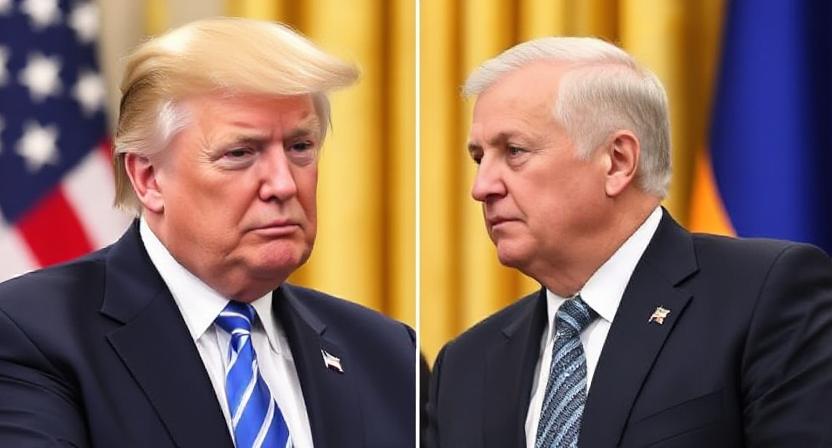
A summit between Ukrainian President Volodymyr Zelensky and former U.S. President Donald Trump during 2019 stands as one of the most heavily controversial major diplomatic events of modern times. The established meeting between two state leaders transformed into a political crisis that both led to Trump’s initial impeachment process while reshaping Ukraine’s diplomatic relationship with the United States. The secret agreements made between Zelensky and Trump have become a focus point for both political groups and public media discussion. This paper examines the chain of events before the meeting alongside the dramatic findings that emerged and the enduring effects of this pivotal meeting between Trump and Zelensky.
The Context: Ukraine, Trump, and the Shadow of Russian Aggression
The full comprehension of the Zelensky-Trump encounter demands evaluation of ongoing geopolitical conflicts in the region. For many years Ukraine served as a central area of rivalry between Eastern and Western forces. The independent Ukraine established since 1991 has worked to join European Union institutions and NATO despite Russian discomfort because Russia considers Ukraine to be within its strategic sphere. Russian military actions had a direct impact on Ukraine between 2014 and the present when they executed the annexation of Crimea and sponsored rebel groups in eastern regions which triggered a lengthy conflict that has resulted in more than 14,000 casualties.
Ukrainian citizens elected Volodymyr Zelensky who was a political novice but successful comedian because he campaigned against corruption and promised peace in April 2019. The broad mass of Ukrainian voters chose Zelensky after they showed their discontent towards established politicians and wished for new political direction. During his presidency Zelensky managed multiple critical challenges which included Russia’s ongoing warfare against Ukraine together with an ailing economy and Ukraine’s requirement for outside support to defend its sovereignty.
The United States experienced foreign policy leadership under Donald Trump which reflected swap-based procedures along with doubting NATO’s alliance importance. During his administration Donald Trump waited his admiration for Russian President Vladimir Putin as he showed doubts about Ukrainian territorial defense being worth U.S. support. The U.S. foreign policy experts alongside allied countries expressed serious concerns because they thought Trump’s reluctance to challenge Russia would enable Moscow to perform additional aggressive acts.

The July 25 Phone Call: A Bombshell Revelation
The Zelensky-Trump meeting confrontation has its main origins in a July 25 2019 telephone conversation between these world leaders. The controversial phone recording between Trump and Zelensky served as the primary evidence during his impeachment proceedings because it emerged through a whistleblower complaint. During their talk Trump made multiple demands of Zelensky to start investigations into Joe Biden as the leading Democratic candidate for 2020 presidential race and his son Hunter Biden who joined Burisma Holdings board.
The demand made by Trump generated public interpretation that he sought to utilize U.S. military aid for obtaining political favors. The Trump administration drew attention when it stopped releasing $400 million worth of military assistance to Ukraine which raised doubts because Ukraine depended on U.S. support to protect itself from Russian attacks. Critics defined Trump’s military aid freeze as a clear power abuse meant to force Zelensky into starting the investigation which could harm Biden’s
presidential run. At the same time Trump and his supporters maintained the aid delay was part of a big foreign aid review process.
The official revealed to U.S. intelligence reported that Trump used his presidential authority during a phone call to ask for election support from a foreign country during the 2020 election. The complaint started a sequence which led the House of Representatives to impeach Trump officially in December 2019. Although Trump survived impeachment by the Senate the scandal damaged his presidency to the extent that it worsened partisan divisions across the United States.
Behind Closed Doors: The Meeting at the UN General Assembly
President Zelensky and President Trump met at the United Nations General Assembly in New York on September 25th through a phone conversation established during July 25th. The meeting occurred while both parties faced close media attention along with severe political pressures. The leaders faced substantial pressure because Zelensky needed U.S. support for Ukraine while Trump needed to defend himself against growing misconduct accusations.
Multiple officials who were at the meeting recalled that the meeting proceeding with friendly yet challenging conditions. Zelensky maintained cautious behavior because he recognized how sensitive the diplomatic relations between Ukraine and the United States had become. Ukraine announced its dedication to addressing corruption during this meeting and thanked the US for its support. During their conversation Trump showed further interest in Ukrainian corruption investigations of the Bidens yet again while urging the Zelensky government to take more action against graft.
Trump directed straight to Zelensky during their meeting by saying “I want you to do us a favor.’ This stand-out statement followed the words used during Trump’s July 25 phone call with his Ukrainian counterpart. The address to Zelensky gave the impression that Trump applied his presidential power to pressure foreign leaders for his own personal benefit. The leaders finished their session with positive outlooks about US-Ukraine relations although hidden disputes remained visible in the room.
The Fallout: Impeachment and Its Aftermath
The August phone call of July 25 and September 25 meeting caused massive disturbances in diplomatic relations between Washington and Kyiv. The United States House of Representatives started an impeachment inquiry to determine if Trump violated his authority through demanding overseas interference in the 2020 presidential election. During the inquiry proceeding officials provided testimony showing that Ambassador Gordon Sondland confirmed the existence of a military aid exchange conditioned on Biden investigations.
The Ukrainian president Zelensky discovered himself stuck in a difficult situation due to these scandals. When Zelensky became the new Ukrainian president he aimed to establish both independence and Wester partnerships as he worked within intense political challenges. Zelensky’s government minimized the scandal by maintaining continuous support for Ukraine’s commitment to open government and political transformation. The scandal produced adverse effects on Zelensky’s presidential leadership while causing doubts about Ukraine’s freedom from foreign manipulation.
Trump faced his Senate impeachment trial during January 2020 that resulted in deepening political partisanship across America. The Democratic Party maintained that Trump misused power but most Republicans viewed the case as manufactured by political forces. Republican Senators voted according to their party affiliation to clear Trump of the impeachment charges and he maintained his presidency. The proceedings of impeachment intensified the rift between Trump supporters and his critics so they established the conditions for an acrimonious 2020 presidential election.
The Broader Implications: U.S.-Ukraine Relations and Global Diplomacy
The Zelensky-Trump summit along with its subsequent consequences established significant impacts on bilateral U.S.-Ukraine diplomatic relations and international affairs. The Ukrainian government confronted significant obstacles while operating between the competing great powers during this incident. Zelensky’s administration successfully retrieved U.S. military assistance but the whole episode showed Ukraine remains susceptible to international pressure and its relationship with Washington faces clear boundaries.
The strategic choice of President Trump to misuse United States aid for his personal interests damaged America’s diplomatic credibility as an advocate for both democracy and law enforcement. The episode caused widespread concerns regarding the damaging effect on institutional foundations which sustain the foundations of the international structure.
This scandal created consequences for worldwide relations especially within the framework of U.S.-Russia diplomatic relations. The issue of Trump’s refusal to stand up to Putin together with his moves to force Ukrainian interference in anti-Biden inquiries appeared as part of his general Russian-friendly approach. The diplomatic method generated worry among U.S. closest partners while inspiring overseas challengers leading to worldwide perceptions that the U.S. withdrew from its position as global leader.
During the ongoing political struggle Zelensky proved his resilience while guiding Ukraine toward its next phase of development
The scandal made Volodymyr Zelensky demonstrate strength and determination to lead Ukraine forward. His presidency actively pursued various reforms which involved anti-corruption policies alongside institutional democratization and Western expansion goals. Zelensky established his political awareness while facing the Trump scandal because he kept Ukraine’s independence central to his strategy.
Ukraine continues to advance its counter-Russian aggression efforts while working toward establishing a secure and prosperous society since the scandal broke out. Ukraine has attracted more assistance from NATO organizations and EU institutions as these bodies demonstrate stronger support for Ukrainian security and progress. The Ukrainian battle in eastern areas continues along with a continuing Russian military threat to address as top priorities.






k5pne6